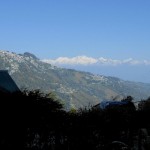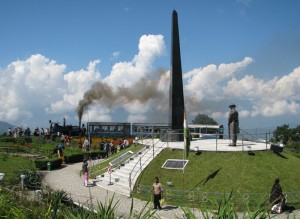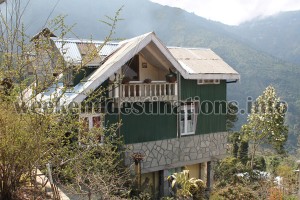Rangaroon is a small scenic tea garden located 6000 feet above sea level and 16 kilometres from Darjeeling with a great view of Mt. Kanchenjungha. With a small population and a tea-growing area of around 90 hectares, it is a popular destination among tourists who wish to extend their Darjeeling trip and take in the natural sights and sounds of the hills. Mostly used as a site for adventure travel, Rangaroon also commands offbeat travellers for its scenic beauty, its high quality tea and the abundance of rare and endangered plant, bird and animal species. BOOKING DETAILS OF RANGAROON
The name Rangaroon is of Lepcha origin and translates into “The turning of the great river”. Indeed, it is at this valley that the River Rungdong takes a turn. The tea estate traces it’s origins to Lord Adain Ashley, the Governor of Bengal, in 1776. During the time, Rangaroon became famous for its premium quality tea, owing to its favourable climatic conditions and elevation. In fact, British colonists were highly fascinated by “Rangaroon tea” and began to brew and produce newer and more improved varieties of it. This is one of the mainstays of Rangaroon even to this day. Another feather in Rangaroon’s cap is the establishment of the first Botanic Garden in the hills in 1876 here.
Whether it is trekking, hiking, adventure sports or wildlife, tourists will never be disappointed by the amazing range of sights and sounds and activities that Rangaroon has to offer.
Places to see in Rangaroon: Rangaroon Tea Garden produces some of the world’s best quality tea, and is home to the world’s famous “Rangaroon” tea. Visitors may take a leisurely stroll through the garden, and breathe in the aroma of fresh tea leaves. In the process, they will also get stunning views of Rangaroon valley, Rungdong River, Tiger Hill, the Observatory Hill and a glimpse of the breathtaking Mt. Kanchenjunga range. Those interested in understanding the nuances of tea cultivation and production may wish to visit the 18th century tea factory that is still open to the public. Here, visitors may also interact with tea growers and tea pluckers to get an in-depth analysis of tea production and processing, as well as understand the different varieties of tea available.
Mata Singha Temple serves as a place of religious significance to the people of Rangaroon. This temple is particularly important on the day of the Baisakhi Purnima, when residents of the valley as well as people from near and far congregate at this temple to offer prayers to the resident deity of the temple.
Senchel Wildlife Sanctuary is home to some of the rarest animal and bird species in India. Some of the fauna of Rangaroong are unique to the hills alone, and are found nowhere else in India. There are guides in the village who locally arrange
Tourists wishing to get a glimpse of old colonial architecture may visit the Old Bungalow, built by the late Frederic von Frostmann, a German native, between 1860 – 1870. Despite of repairs being conducted to the bungalow, a lot of it’s original structure have remained intact since it’s inception in 1860. Apart from rare and old paintings, a complete view of old fashioned architecture and gardening styles can be observed in the bungalow.
Nearby Attractions of Rangaroon: From the world famous Tiger Hill from, you can catch a panoramic view of the first rays of the sun rising over the Mt. Kanchenjunga range. This view is very popular with all tourists who choose to visit Darjeeling and nearby hill-stations. Those interested in visiting Tiger Hill are requested to leave as early as 3:00 am.
Visiting the Observatory Hill affords tourists an excellent vantage point of the Himalayan range, and is also a place of tremendous historical importance. On a tourist’s itinerary, Rangaroon could serve as an excellent stop over to the main Darjeeling town. All those who do not want to stay at Darjeeling due to its commotion can stay at Rangaroon and visit Darjeeling on day trips. In addition to Himalayan Mountaineering Institute, the Everest Museum, the Rock Garden as well as numerous places to shop, eat and relax, Darjeeling offers tourists endless possibilities to unwind and take in the beauty of unspoiled nature.
Things to do in Rangaroon: Trekking and Adventure Sports is a major attraction of Rangaroon. Whether amateur or seasoned, a tourist willing to seek out a bit of adventure sports will truly enjoy the variety of adventure sports available, such as mountain biking. Tourists will also be able to trek along the vast array of designated trekking zones along the Rungdung River, Senchal Forest and tea gardens.
Bird-watching in Rangaroon is another great activity for wildlife enthusiasts and ornithologists. You can spot some of the rarest Himalayan bird species in Rangaroon. Another nice activity could be tea sampling – tourists will be able to sample some of the highest quality teas available in the hills, such as the famous Rangaroon tea blend in the local factory
Best time to visit Rangaroon: You can visit Rangaroon any time of the year. The winters are best for catching a glimpse of the snow-capped peaks, the spring is famous for the bloom of flowers all around the valley. The fresh tea leaves bloom during monsoons, which gives a magnificent lush hue to the this tea valley.
How to reach Rangaroon: On the way to Darjeeling, you would need to take a turn from Jorebungalow, which is situated 60 kms from Siliguri. Rangaroon is around 08 kms from Jorebungalow.
Lodging and dining facilities in Rangaroon: A wooden cottage with three rooms is managed as a homestay by a local family for the guests. The homestay is well-equipped with hot and cold running water, western bathrooms, electricity and other modern facilities. There are two attic cozy rooms and two larger rooms with double beds – all connected by wooden stairs. A dining room and a sit-out area also features within the cottage. The whole cottage faces Mt. Kanchenjungha and the surrounding jungle and tea gardens. A few minutes walk from the home stay would take you to the Old Bungalow and the tea gardens. Guided tours, hikes and treks to all the attractions are routinely arranged by the home stay. The food is essentially Indian and home cooked and the ingredients are mostly locally sourced.















